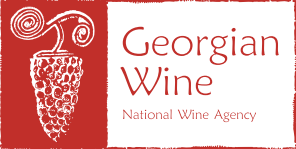
The prices of red wine will be increased by 25 percent and white wine - by 5 percent from New Year onwards, according to Georgian winemaking companies. Khvanchkara wine will see the highest increase in price and will be sold with a 70 percent rise in price. The reason for the increased prices of Georgian wine is that winemaking companies purchased the grapes of vintage 2013 for higher prices than in previous years.
Aleksandrouli and Mujuretuli grape varieties which are used for making Khvantchkara wine are the most expensive grapes, whose price reached GEL 8 this year, while it was GEL 4 in 2012. More than 900 tonnes of Aleksandrouli and Mujuretuli were passed as this year’s vintage.
As the industry representatives say, Georgian wine will be sold at increased prices mainly on export markets and not in Georgia.
The average price of Georgian wine today is GEL 10-15 for white wine and GEL 15-20 for red wine. The prices for white wine start from GEL 3.80 and go up to GEL 151. As for red wine, prices start from GEL 5.80 and go up to GEL 200. The most expensive wine today is Saperavi, according to the wine store Vinoteka.
Another reason for the rise in price is increased demand for Georgian wine on export markets, according to industry representatives. They fear that Georgian wine will lose its positions on foreign markets due to the increased price as it lacks the competitive advantages of other wines.
“The price of grapes which was fixed this year was inadequate,” said Giorgi Margvelashvili, President of Tbilvino. “Now we are forced to raise prices. As 96 percent of Tbilvino wines’ sales volume is made up by export markets, our company will raise the price mainly for them and not for the Georgian market. The price will be increased in Georgia as well but only slightly. After the increase in price Georgian wine will likely become less competitive on foreign markets and the demand for it might decrease. It is true that the Russian market has opened and it contributes a lot to the increasing sales statistics, but the Russian market is not reliable for us taking into consideration the recent Russian embargo,” he added.
After the six-year embargo, rationalized by apparent low quality and large number of falsified products, Georgian wine returned to Russian shelves in June 2013 which led to increased demand for Georgian wine. 20 million bottles of wine were exported to Russia alone in the 5 month period since the lifting of the embargo, while by comparison 23 million bottles of wine were exported in total during the whole of 2012, according to the National Wine Agency of Georgia. The second place is held by Ukraine where more than 8.523 million wine bottles were exported to during the whole of 2013.
The embargo saw Georgian exports slump from more than USD 80 million in 2005 to as little as USD 29 million in 2007, according to the statistics.
The top-five export countries also include Kazakhstan, Belarus, and Poland - comprising 20.7 percent of entire export. They are followed by Latvia, China, Lithuania, Estonia, the USA, and other countries. Georgia has also begun to export wine to Brazil, Turkmenistan, Egypt, Italy, Singapore, Jordan, Sweden, and Spain.
32,425 thousand litres of alcoholic beverages were exported from Georgia in 2013 with a total value of USD 139,126 thousand. As for in 2012, 38,922 thousand litres of alcoholic beverages were exported, with a total value of USD 149,348 thousand. Wine made of fresh grapes makes up the largest part of exported alcohol - 21,187 litres.
“The first flow of wine with increased prices will appear in stores from the New Year onwards,” said Tamar Devdariani, Director of the Georgian Wine House store. “Kvanchkara will be the most expensive wine. If we take into consideration the fact that the price of grapes increased by 100 percent, it is possible that the price of the wine will increase by 100 percent as well. I doubt that this will reduce sales. The solvency of Georgian customers is already low and a rise in price will further reduce it,” she added.
“Price increase is justified within the framework of the right marketing activities,” said Nuca Avalishvili, Event Manager at Teliani Valley Company. “But if this trend continues, it will be very difficult for Georgian wines to be presented on Asian and American markets where other companies have competitive advantages because of good awareness and price policy,” she added.
Due to increased prices and expected reduction of Georgian wine abroad, the winemaking companies are trying to come up with ideas for finding alternative ways so as to not be dependent on smallholder farmers anymore. “The entrepreneurs will start their own vineyards or think about importing grapes from other countries,” said Margvelashvili.
“The interests of the wine-growers and winemaking companies will never coincide as one side wants to sell the grapes expensively and the other side wants to buy them cheap,” said Levan Davitashvili, Head of the National Wine Agency of Georgia. “The companies should not complain about the price increase of grapes as the state proposed a different mechanism of subsidy for them. As a result the companies have not incurred losses and have not spent more than in previous years. Within the framework of subsidizing, if a company was paying GEL 1 for 1 kilogram of Rkatsiteli grape it was receiving 40 Tetri from the state. In addition, they were offering cheap loans - whereas before working capital facilities were available from banks with 13-15 percent interest rates, this year the state covered 9 percent of that, which is an important benefit for the companies,” he added.
“Georgian winemaking companies started reequipping the enterprises in 2013 and many of them are going to do the same in 2014. They have grown their reservoir capacity and renovated the installations. Preferential agro credits contributed to these activities. The companies were able to take out loans for 1 percent for reequipping their enterprises. So the reason for the sharp increase of prices is arbitrary,” Davitashvili said.
Within the framework of Vintage 2013 the vine-growers in the Kakheti region got income of more than GEL 100 million through the realization of grapes, according to the Ministry of Agriculture of Georgia. As for the entrepreneurs, they took out extra special preferential loans. In total 38 preferential loans were issued worth GEL 43,688,024.
17,000 families have received direct income. The largest number of grapes was produced in the village Big Chailuri where the farmers got compensation of GEL 200,000. An average of 5 tonnes of grape were produced in Rtveli 2013 and the families got about GEL 7,000 remuneration.
A record number of grapes, 88,742.0 tonnes, were processed in 2013 by 84 companies while 52,000 tonnes were processed in 2012. The share of processed grapes purchased by the state-owned companies reached 17 percent while it was 65 percent in 2012. The rest of the harvest was taken by the private sector.
The most popular grape varieties were Muzukani, Akhasheni and Kindzmarauli whose prices reached GEL 2.10 per kilogram. On 12 September 4,500 tonnes of Saperavi were processed which was the highest recorded indicator of the last 20 years. In general the largest part of the grape market is made up by Rkatsiteli. In total 100,000 tonnes of grape were processed as part of Vintage 2013 and out of that amount 65 percent was Rkatsiteli. The grapes processed by families are almost completely Rkatsiteli as well.
There are 35,000 hectares of vineyards in Georgia today.
“I would evaluate Vintage 2013 very positively. The Government was not involved in the processes but private entities are standing between the winemaking companies and the wine-growers which caused the increased prices of grapes. I would like for such intermediaries to no longer stand between us. I would also like the Government to continue the subsidy programme next year as well, but I doubt that they will propose it again as the demand for grapes has increased and the companies have to buy the grapes anyway - whether they are cheap or not,” Margvelashvili said.
© finchannel.com






